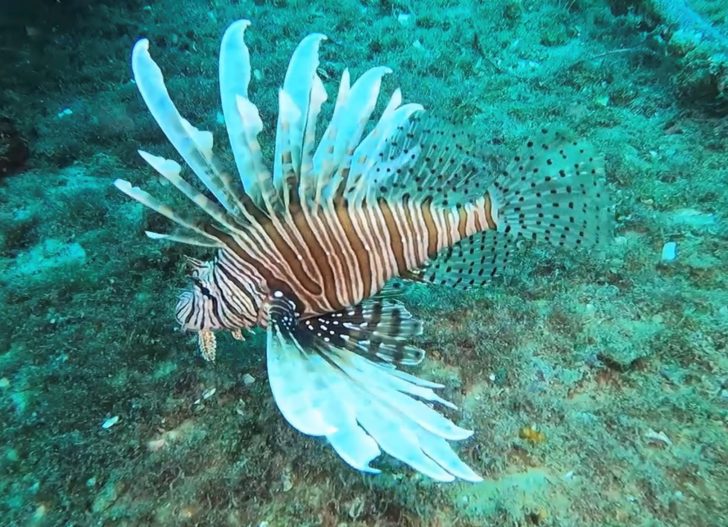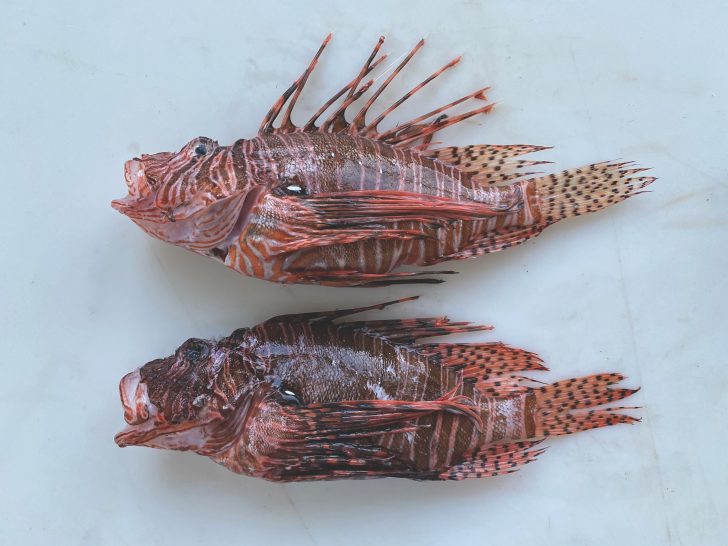By Michael Sipos, Florida Sea Grant Agent, UF/IFAS Extension
Florida Fish and Wildlife Conservation Commission Lionfish Spearing Records:
· Atlantic – Longest: 18.78 inches, caught off Islamorada
· Gulf – Longest: 18.70 inches, caught off Destin
· Gulf – Heaviest: 3.77 pounds, caught off Pensacola

Lionfish belong to the Scorpaenidae family, which contains about 500 species of mostly marine fish that live in tropical and temperate seas. Two nonnative species of lionfish are in the western Atlantic Ocean: the red lionfish (Pterois volitans) and the devil firefish (Pterois miles).
These two species look at lot like each other, but about 97 % of Atlantic are red lionfish.
Because they’re hardy, and good at defending themselves, lionfish have quickly spread throughout the Atlantic and Caribbean. They can now be spotted from Massachusetts to Venezuela, with their range expected to expand.
Lionfish can live in depths up to 1,000 feet, tolerate temperatures as low as 50 degrees and withstand low salinities. A more typical environment for lionfish is on shallower natural or artificial reefs, ledges, wrecks and other offshore structures in stable temperatures and salinities.
A lot of people know lionfish are venomous. These slow-moving fish are passive (unless you happen to be a small fish or invertebrate) and use their 18 grooved venomous spines to defend themselves, rather than attack. The spines are not hollow, like snake fangs, but are grooved and hold venomous glandular tissue. The venom of a lionfish sting contains a neurotoxin and acetylcholine, which affects neuromuscular transmission. Stings can be painful for several hours, but they’re rarely fatal.
Lionfish grow fast and have lots of eggs. In warmer climates, it’s possible for a female lionfish to spawn every four days, releasing two gelatinous egg masses, which can hold a combined 15,000 to 30,000 eggs.
The larval stage of this fish typically lasts 20 to 40 days, before it grows into a more recognizable juvenile lionfish. Both male and female lionfish can reach maturity within a year. It is believed that lionfish can live 10 to 15 years in their native range with individuals living much longer in captivity.
If it can fit in its mouth, a lionfish can eat it. They have been known to consume prey nearly half their length and eat a wide variety of fish and invertebrates. The large, webbed pectoral fins of the lionfish are not only for ornamentation/signaling but are used to herd prey when flared out.
These invaders can consume juvenile commercially and recreationally valuable species, compete for resources with native animals and snack on herbivorous species who help maintain the reef. To be considered an invasive species the organism must be nonnative, introduced by humans and can cause environmental, economic, or human harm.
What can you do to help with the lionfish and other invasive species?
· First, never release your pets. In addition, educate others about responsible pet ownership.
· Second, if you can’t beat them, eat them. Lionfish are delicious and will quickly become one of your favorite seafood meals/
· Third, get involved in invasive species removal efforts.
On the Radar, the FWC Reef Rangers are hosting The Lionfish Challenge which is a summer-long tournament open to participants from anywhere in the state! Another great lionfish event is The Emerald Coast Open which is schedule to take place in Destin Florida May 13-14th, 2022. This tournament filled with activities and education. is by far the largest lionfish roundup out there with over 10,000 lionfish removed during the 2021 event! Head online to find more information on these efforts and other derbies to find out how you can get involved.
Before you attempt to remove any invasive species like the lionfish, review how to harvest and handle them safely before trying to do so yourself. Lionfish are a slow-moving easy target, and you will be doing a service to both the environment and your tummy.
Michael Sipos is the Florida Sea Grant agent for UF/IFAS Extension, an equal opportunity institution. Contact him at sipos624@ufl.edu.

